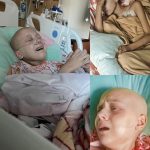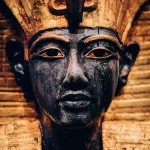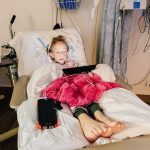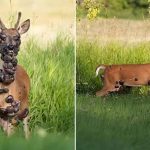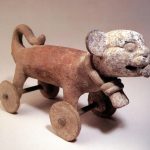The Little Shepherdess of Shattered Stones

The Morning After: Dawning Despair:
The air tasted of ash and the metallic tang of dried blood. Lena, barely ten years old, coughed, the acrid smoke still clinging to her throat from the firestorm that had raged through their village just hours before. The sun, a pale, anemic disk struggling to pierce the perpetual haze of dust and smoke, cast long, grotesque shadows over what remained of their home.

Their home. A jagged tooth of a wall, scarred with soot, was all that stood. The roof had collapsed, beams splayed like broken limbs. Where their small garden once thrived with hopeful greens, now only splintered wood and twisted metal lay testament to the ferocity of the shelling.
Lena adjusted the heavy shawl on her back, feeling the warm, rhythmic breathing of Elara, her baby sister, nestled securely against her. Elara, just eighteen months old, was blissfully unaware, her tiny fist clutching a lock of Lena’s tangled hair. Lena’s other hand was firmly clasped around the sticky, grimy fingers of Mikael, her five-year-old brother, who whimpered softly, his wide eyes reflecting the ruins around them with a terrifying clarity.

Their parents were gone. Disappeared in the chaos of the night, amidst the deafening roar of explosions and the frantic screams of neighbors. Lena had searched, her small body weaving through the panicked crowd, her calls swallowed by the din, until the need to protect her siblings had become an undeniable, visceral command.
The Journey Begins: A Flicker of Hope in the Ruins

“Lena… I’m hungry,” Mikael whispered, his voice cracking.
Lena bit her lip, tasting dust. Her own stomach growled, a hollow ache she tried to ignore. She remembered her mother’s last words, screamed over the chaos: “Go to the old mill! The path by the river! Stay together!”
The old mill was miles away, across what was now a moonscape of destruction. But it was a direction, a purpose.
“We will find food at the mill, Mikael,” Lena said, her voice attempting a confidence she didn’t feel. “Mama said so.” She took a deep breath, scanning the pulverized landscape. Every step would be a gamble.
Action: Lena spotted a path, barely visible, winding between the rubble of what used to be the baker’s shop and the collapsed bell tower of the village church. It was treacherous, strewn with debris.

“Hold my hand tight, Mikael,” she commanded, her grip tightening. “Don’t look down. Just watch my feet.”
She began to pick her way forward, her eyes darting constantly. Every few steps, she would brace herself, using a remaining wall or a large stone for balance, as she navigated over broken glass and jagged shards of concrete. The baby, Elara, jostled gently on her back, a fragile cargo. Mikael stumbled often, and Lena would instinctively yank him upright, her small arm surprisingly strong, pulling him through the treacherous terrain.

A sudden, sharp crack from above startled them—a section of a precarious wall shifted, sending a cascade of stones tumbling down. Lena reacted instantly, throwing her body slightly to the side, shielding Mikael and turning her back to protect Elara. A shower of dust and small pebbles rained down on them, but they were unharmed. Mikael cried out, burying his face in Lena’s side.
“It’s okay, little one,” Lena murmured, her own heart racing. “Just the wind.”
The Burden of Care: Small Hands, Big Responsibilities

They walked for what felt like an eternity. The sun climbed higher, beating down mercilessly. Elara began to fuss, her soft cries piercing the heavy silence. Lena knew the baby needed water, perhaps milk, things they didn’t have. She rummaged through the small canvas bag she’d managed to grab—a half-eaten loaf of stale bread, a tattered doll.
She pulled out the doll, its fabric faded and worn, and offered it to Elara, who immediately quieted, clutching it to her chest. Then, she tore off a small piece of the stale bread for Mikael, urging him to chew slowly.
“We rest here,” Lena announced, sinking down onto a relatively flat piece of concrete, carefully easing Elara off her back and onto her lap. She gently ran her fingers over Elara’s soft cheek, then pressed a kiss to Mikael’s dusty forehead. Her own weariness was immense, a heavy cloak draped over her small frame. But the sight of their trusting, vulnerable faces spurred her on. She was their mother now, their father, their protector.

The photograph would have been taken at a moment like this – a small girl, dirt smudged on her cheek, a baby strapped to her back, holding the hand of another, smaller child. Behind them, the skeletal remains of their life. But the lens, while capturing devastation, also captured an unspoken truth: their bond was a fortress. The baby’s peaceful sleep, Mikael’s dependence, Lena’s unwavering gaze forward—it was all a testament to a strength that defied their years.
Towards the Horizon: A Flicker of Light
As dusk began to paint the ravaged sky in hues of orange and bruised purple, they saw it – the distant outline of the old mill, its stone walls still standing, seemingly untouched. A tiny flicker of hope ignited within Lena’s chest.

“Look, Mikael!” she exclaimed, pointing with a trembling finger. “The mill! Mama was right!”
Mikael’s face, etched with fear and exhaustion, finally broke into a small, hopeful smile. He tightened his grip on Lena’s hand, drawing strength from her.
Lena picked up Elara, carefully resettling her on her back. The journey wasn’t over, but the end was in sight. She was just a child, yet she carried the weight of a family, the legacy of a shattered world, and the fragile hope for a new beginning. In her innocent strength, in their unbreakable bond, was the resilience of humanity itself, a small, stubborn flame refusing to be extinguished by the darkness.



